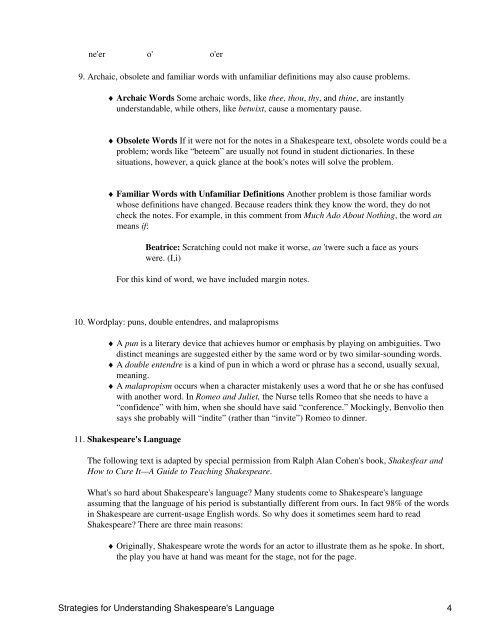Create successful ePaper yourself
Turn your PDF publications into a flip-book with our unique Google optimized e-Paper software.
ne'er o' o'er<br />
9. Archaic, obsolete and familiar words with unfamiliar definitions may also cause problems.<br />
♦ Archaic Words Some archaic words, like thee, thou, thy, and thine, are instantly<br />
understandable, while others, like betwixt, cause a momentary pause.<br />
♦ Obsolete Words If it were not for the notes in a Shakespeare text, obsolete words could be a<br />
problem; words like “beteem” are usually not found in student dictionaries. In these<br />
situations, however, a quick glance at the book's notes will solve the problem.<br />
♦<br />
Familiar Words with Unfamiliar Definitions Another problem is those familiar words<br />
whose definitions have changed. Because readers think they know the word, they do not<br />
check the notes. For example, in this comment from Much Ado About Nothing, the word an<br />
means if:<br />
Beatrice: Scratching could not make it worse, an 'twere such a face as yours<br />
were. (I,i)<br />
For this kind <strong>of</strong> word, we have included margin notes.<br />
10. Wordplay: puns, double entendres, and malapropisms<br />
♦ A pun is a literary device that achieves humor or emphasis by playing on ambiguities. Two<br />
distinct meanings are suggested either by the same word or by two similar-sounding words.<br />
♦ A double entendre is a kind <strong>of</strong> pun in which a word or phrase has a second, usually sexual,<br />
meaning.<br />
♦ A malapropism occurs when a character mistakenly uses a word that he or she has confused<br />
with another word. In Romeo and Juliet, the Nurse tells Romeo that she needs to have a<br />
“confidence” with him, when she should have said “conference.” Mockingly, Benvolio then<br />
says she probably will “indite” (rather than “invite”) Romeo to dinner.<br />
11. Shakespeare's Language<br />
<strong>The</strong> following text is adapted by special permission from Ralph Alan Cohen's book, Shakesfear and<br />
How to Cure It—A Guide to Teaching Shakespeare.<br />
What's so hard about Shakespeare's language Many students come to Shakespeare's language<br />
assuming that the language <strong>of</strong> his period is substantially different from ours. In fact 98% <strong>of</strong> the words<br />
in Shakespeare are current-usage English words. So why does it sometimes seem hard to read<br />
Shakespeare <strong>The</strong>re are three main reasons:<br />
♦ Originally, Shakespeare wrote the words for an actor to illustrate them as he spoke. In short,<br />
the play you have at hand was meant for the stage, not for the page.<br />
Strategies for Understanding Shakespeare's Language 4




